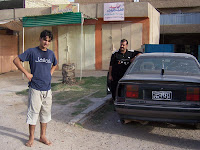 It is the kind of thing that can happen anywhere, and when it does happen the consequences can be tragic. When it happens in a volatile neighborhood in Baghdad, however, tragic consequences may actually be the objective of the enemy. My heart skipped a beat when a young boy of about eight or nine years pushed his way through the other boys clamoring for my attention. He pointed to the 9mm Beretta strapped to my thigh, then patted a bulge at his waist beneath his shirt. As he started to move away, he casually pulled up his short to reveal a pistol grip protruding from his belt. I grabbed him, and yanked the weapon away. It was a toy. I started scolding him loudly, then realized that my interpreter was off with some other soldiers talking to a group of shopkeepers.
It is the kind of thing that can happen anywhere, and when it does happen the consequences can be tragic. When it happens in a volatile neighborhood in Baghdad, however, tragic consequences may actually be the objective of the enemy. My heart skipped a beat when a young boy of about eight or nine years pushed his way through the other boys clamoring for my attention. He pointed to the 9mm Beretta strapped to my thigh, then patted a bulge at his waist beneath his shirt. As he started to move away, he casually pulled up his short to reveal a pistol grip protruding from his belt. I grabbed him, and yanked the weapon away. It was a toy. I started scolding him loudly, then realized that my interpreter was off with some other soldiers talking to a group of shopkeepers.The gaggle of kids, maybe a dozen in all, followed me to retrieve my interpreter. The disarmed gunman rushed to the protection of a group of older male relatives, and refused leave their side when I beckoned him over as I continued my lecture. The adults appeared amused when I pulled my pistol and held it next to the toy. "Do you see this?" I asked through my interpreter. "They look almost the same, don't they? Are you trying to get killed?! Do you think a soldier can tell the difference from a distance?!" Some of the older kids seemed to get it. The adults just continued grinning stupidly. I pulled out a couple of dollars and gave them to the kid. I told him that this time I'm buying the toy from him. Next time we'll simply take them. When we got back to base, a soldier from the same patrol tossed me another plastic gun confiscated on the same mission. "Here's another for your collection."
Later that day I learned that it wasn't so long ago that some kids were playing with toy guns and pointed them at an American patrol from behind a brick wall. That time the results were tragic. A Bradley fighting vehicle spun its main gun around and neutralized the "threat". These are not accidents. These are the results of a sinister strategy on the part of some insurgents who have been known to flood neighborhoods with toy guns with the intent of producing exactly this kind of result.
Fortunately, this time nobody got hurt. Another good day in Baghdad.









 I know, I know... The similarities are eerie.
I know, I know... The similarities are eerie. 